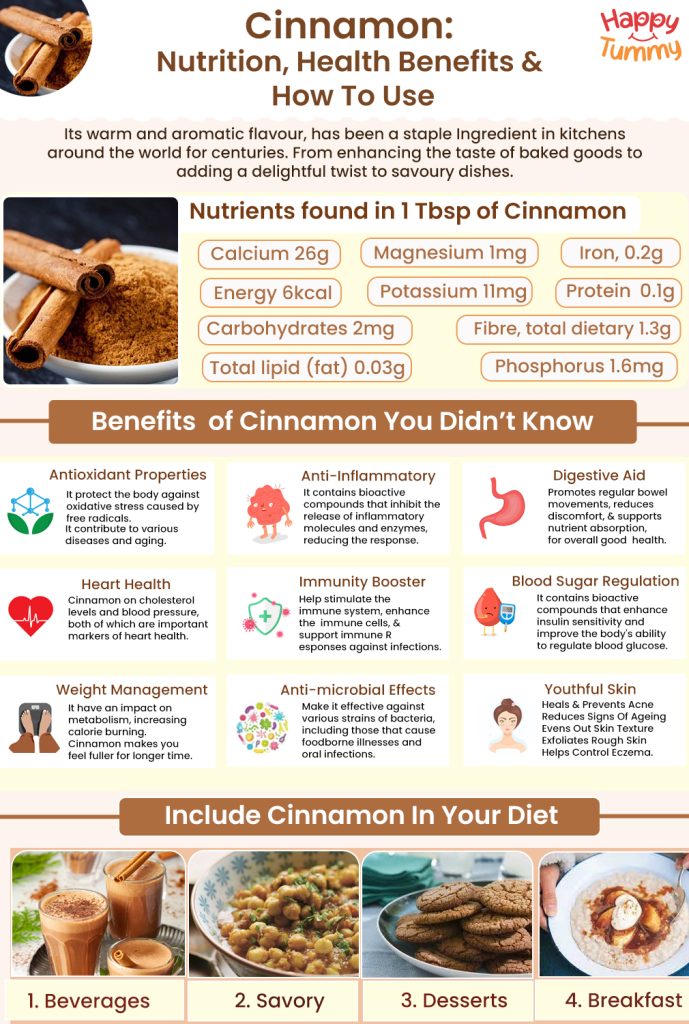Table of Contents
Cinnamon, a beloved spice known for its warm and aromatic flavour, has been a staple ingredient in kitchens around the world for centuries. From enhancing the taste of baked goods to adding a delightful twist to savoury dishes, cinnamon has undoubtedly earned its place as a kitchen favourite.
But did you know that cinnamon is more than just a flavorful spice? It turns out that cinnamon possesses an array of surprising health benefits that extend far beyond its culinary uses.
No wonder it was once deemed more precious than gold.
It is native to Sri Lanka. But its value transcended mere culinary purposes, playing significant roles in ancient Egypt, medieval Europe, and the lucrative trade of the Dutch East India Company. From embalming and religious practices in Egypt to its use in religious rites and as a flavouring agent in medieval Europe, cinnamon’s allure and profitability have spanned centuries, making it a treasure sought after by civilizations throughout time. [1]
In this blog, we will uncover the remarkable benefits of cinnamon on our well-being, and discover how it can enhance our overall health.
Key Nutrients Found in Cinnamon
Cinnamon is a spice derived from the inner bark of trees belonging to the Cinnamomum family. It is harvested by cutting the tree’s bark and allowing it to dry, curling into what are known as cinnamon sticks or quills.
These sticks can be ground into a fine powder to create ground cinnamon. It has a warm, sweet, and aromatic flavour, which makes it a popular ingredient in various cuisines around the world
Here are some key nutrients found in cinnamon:
Manganese: Cinnamon is an excellent source of manganese, a mineral that plays a vital role in various bodily functions. Manganese is involved in supporting bone health, promoting collagen production, and participating in antioxidant defences.
Fibre: Cinnamon contains a notable amount of dietary fibre, which is essential for a healthy digestive system. Fibre aids in maintaining regular bowel movements, promoting satiety, and regulating blood sugar levels.
Calcium: While not a significant source of calcium, cinnamon provides a small amount of this essential mineral. Calcium is crucial for maintaining strong bones and teeth, supporting muscle function, and assisting in nerve transmission.
Iron: Cinnamon contains traces of iron, a mineral necessary for the production of red blood cells and oxygen transport throughout the body. Iron also plays a role in energy metabolism and supporting the immune system.
Calorie and Macronutrient Content: Cinnamon is a low-calorie spice that can add flavor and nutritional value to your meals without significantly impacting your daily caloric intake. Here’s a breakdown of the calorie and macronutrient content of cinnamon:
Calories: One teaspoon of ground cinnamon contains approximately 6 calories, making it a calorie-light addition to your diet.
Carbohydrates: Cinnamon is primarily composed of carbohydrates, with a small amount of sugar. However, the carbohydrate content of cinnamon is minimal, typically contributing less than 1 gram per teaspoon.
Fat and Protein: Cinnamon is a spice that is virtually fat-free and contains negligible amounts of protein.
Nutrients found in 1 teaspoon of Cinnamon [2]
| Nutrient | Amount (mg) |
| Calcium, Ca | 26 |
| Iron, Fe | 0.216 |
| Magnesium, Mg | 1.56 |
| Phosphorus, P | 1.66 |
| Potassium, K | 11.2 |
| Energy | 6.42 |
| Protein | 0.104 |
| Carbohydrates, | 2.1 |
| Fibre, total dietary | 1.38 |
| Total lipid (fat) | 0.032 |
What are the major Benefits of Cinnamon?

1. Cinnamon as a Digestive Aid
Digestive health is essential for overall well-being as it ensures the proper breakdown, absorption, and utilization of nutrients from the foods we consume. An optimal digestive system promotes regular bowel movements, reduces discomfort, and supports nutrient absorption, leading to improved overall health.
Cinnamon has a long history of use as a digestive aid in traditional medicine. It contains compounds that can enhance digestion and alleviate digestive discomfort. It promotes the secretion of digestive enzymes which help break down carbohydrates, proteins, and fats, respectively. By stimulating enzyme production, cinnamon facilitates the digestion and absorption of nutrients.
Cinnamon also possesses properties, that help reduce bloating, gas, and stomach cramps. It aids in relieving digestive discomfort by relaxing the smooth muscles in the gastrointestinal tract, facilitating smoother digestion and reducing symptoms of indigestion.
2. Antioxidant Properties of Cinnamon
Antioxidants are compounds that help protect the body against oxidative stress caused by free radicals. Free radicals are unstable molecules that can damage cells and contribute to various diseases and aging. Antioxidants neutralize these free radicals, preventing or reducing their harmful effects.
Cinnamon is renowned for its high antioxidant content. These antioxidants neutralize free radicals, protecting cells from oxidative damage. The unique combination of antioxidants in cinnamon contributes to its potential health-promoting effects.
3. Blood Sugar Regulation
Cinnamon has a positive impact on blood sugar levels, particularly in individuals with diabetes or insulin resistance. It contains bioactive compounds that enhance insulin sensitivity and improve the body’s ability to regulate blood glucose. By aiding in glucose metabolism, cinnamon may help manage diabetes and promote stable blood sugar control.
4. Anti-Inflammatory Properties of Cinnamon
Inflammation is a natural response by the body to protect against harmful stimuli, such as injuries or infections. However, chronic inflammation can contribute to the development of various diseases. This makes managing inflammation crucial for maintaining optimal health and reducing the risk of chronic conditions.
Cinnamon possesses potent anti-inflammatory properties. It contains bioactive compounds that inhibit the release of inflammatory molecules and enzymes, reducing the inflammatory response. Cinnamaldehyde, in particular, has been studied for its anti-inflammatory effects.
5. Cinnamon and Heart Health
Cinnamon has shown promise in promoting heart health. The active compounds in cinnamon have been found to have anti-inflammatory, antioxidant, and antiplatelet effects, all of which contribute to cardiovascular well-being.
Impact of Cinnamon on Cholesterol Levels and Blood Pressure: Several studies have explored the effects of cinnamon on cholesterol levels and blood pressure, both of which are important markers of heart health. Research suggests that cinnamon can help lower total cholesterol, LDL cholesterol (the “bad” cholesterol), and triglyceride levels. Additionally, cinnamon may have a modest impact on blood pressure by dilating blood vessels and improving blood flow. [3][4]
6. Cinnamon as an Immune System Booster
A robust immune system is essential for overall health, as it helps prevent and fight infections, supports wound healing, and plays a role in surveillance against many diseases.
Cinnamon is recognized for its immune-boosting properties as it contains various bioactive compounds, including cinnamaldehyde and eugenol, which have antimicrobial and anti-inflammatory effects.
These compounds help stimulate the immune system, enhance the activity of immune cells, and support immune responses against infections. [5]
7. Anti-microbial Effects
Cinnamon contains natural antimicrobial compounds, such as cinnamaldehyde, which exhibit antimicrobial activity against various pathogens. Cinnamon’s antimicrobial properties make it effective against various strains of bacteria, including those that cause foodborne illnesses and oral infections.
8. Weight Management
Because Cinnamon helps in regulating blood sugar levels, which can reduce cravings for sugary foods and prevent energy crashes, it aids in weight management. It may also have an impact on metabolism, increasing calorie burning.
Cinnamon makes you feel fuller for longer and decreases your appetite which helps you to not munch on junk food and overeating.
To use cinnamon for weight management, sprinkle it on foods like oatmeal or yogurt, or add it to warm beverages instead of sweeteners. Remember, though, that cinnamon should be part of an overall healthy diet and exercise plan.
While cinnamon is a good way to accelerate your weight management journey, it is not a magic solution. You must always consult with a healthcare professional before making significant changes to your diet.
How to include Cinnamon in your diet?
Cinnamon is available in various forms, including ground cinnamon, cinnamon sticks, and cinnamon essential oil. Each form has its own unique characteristics and uses.
Breakfast Ideas
- Sprinkle ground cinnamon on oatmeal, cereal, or yogurt for a warm and flavorful twist.
- Add a dash of cinnamon to pancake or waffle batter for a delightful breakfast treat.
- Blend cinnamon into smoothies or shakes for a hint of spice.
Beverage Enhancements
- Stir a cinnamon stick into your coffee, tea, or hot chocolate for a fragrant and cozy beverage.
- Infuse cinnamon into homemade iced tea or lemonade for a refreshing twist.
- Add a sprinkle of cinnamon to your favourite milk or plant-based beverage.
Savoury Delights
- Incorporate cinnamon into savoury dishes like stews, curries, or roasted vegetables for a touch of warmth and depth of flavour.
- Use cinnamon as a seasoning for grilled meats or poultry to add a unique taste dimension.
- Experiment with cinnamon-infused marinades or sauces to enhance the flavour profile of your dishes.
Baking and Desserts
- Include cinnamon in baked goods such as cookies, muffins, and bread for a delightful aroma and taste.
- Sprinkle cinnamon and sugar mixture over freshly baked pastries or fruit for a simple yet delicious dessert.
- Try making cinnamon-infused syrups or glazes to drizzle over pancakes, French toast, or desserts.
Precautions to be taken when using Cinnamon
While cinnamon is generally safe for consumption, it’s important to use it in moderation.
The recommended daily dosage is typically 1 to 4 grams, which is about half a teaspoon.
However, some individuals may be more sensitive to cinnamon or may have specific health conditions that require caution. If you have any concerns or are unsure about cinnamon’s suitability for your diet, consult with a healthcare professional.
Conclusion
Incorporating cinnamon into our diets can be a simple yet effective way to harness its health-promoting properties. Whether we sprinkle it on our morning oatmeal, stir it into our favourite beverages, or experiment with using it in savoury dishes or baked goods, cinnamon can add a delicious and beneficial twist to our meals.
However, it’s essential to remember that cinnamon should be part of a holistic approach to health. It cannot replace a balanced diet and regular exercise.
So, the next time you reach for that jar of cinnamon in your pantry, remember its rich history, its surprising health benefits, and the potential it holds to enhance your well-being. Embrace cinnamon as a flavorful ally on your journey to a healthier and happier life.
FAQs
Drinking cinnamon every day in moderate amounts is generally safe for most people. However, consuming excessive amounts of cinnamon or taking cinnamon supplements in high doses may have adverse effects. It can irritate the digestive system, cause allergic reactions in some individuals, or interact with certain medications.
A general guideline is to limit your intake to 1-1.5 teaspoons (2-4 grams) of cinnamon powder per day.
You can sprinkle it on oatmeal, yogurt, or smoothies.
Add it to baked goods, such as cookies or muffins.
Mix it into your coffee, tea, or hot cocoa.
Use it as a spice in savoury dishes like curries or stews.
While it’s generally safe to consume cinnamon on an empty stomach, some individuals may experience mild digestive discomfort or irritation. If you have a sensitive stomach or are prone to heartburn, it may be better to consume cinnamon with a meal or after eating.
There is no specific best time to take cinnamon as it can be consumed throughout the day. You can incorporate cinnamon into your meals or beverages based on your preferences and dietary habits.















